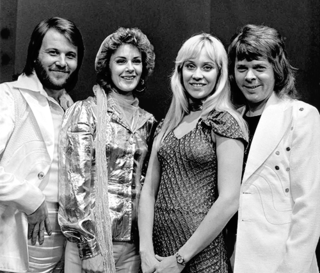
ABBA were a Swedish pop supergroup formed in Stockholm in 1972 by Agnetha Fältskog,Björn Ulvaeus,Benny Andersson,and Anni-Frid Lyngstad. The group's name is an acronym of the first letters of their first names arranged as a palindrome. They are one of the most popular and successful musical groups of all time,and are one of the best-selling music acts in the history of popular music,topping the charts worldwide from 1974 to 1982,and again from 2016 to 2022 following their reunion.
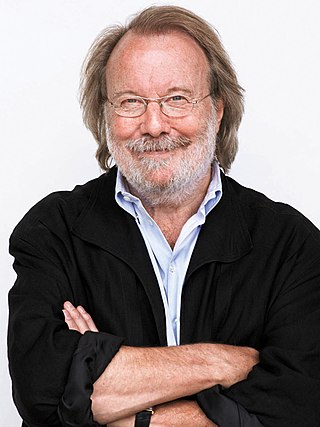
Göran BrorBennyAndersson is a Swedish musician,composer and producer best known as a member of the pop group ABBA and co-composer of the musicals Chess,Kristina från Duvemåla,and Mamma Mia! For the 2008 film version of Mamma Mia! and its 2018 sequel,Mamma Mia! Here We Go Again,he worked also as an executive producer. Since 2001,he has been active with his own band Benny Anderssons orkester.

Waterloo is the second studio album by the Swedish pop group ABBA,and the first released internationally. It was originally released on 4 March 1974 in Sweden through Polar Music. The album's title track won ABBA the 1974 Eurovision Song Contest and became a global hit,launching the group's career.
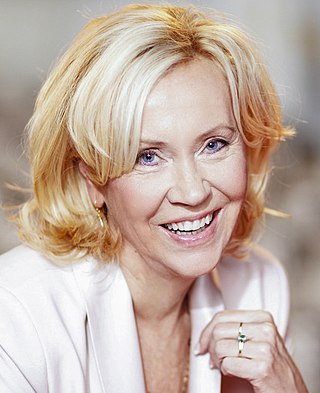
Agneta Åse Fältskog,known as Agnetha Fältskog and AnnaFältskog,is a Swedish singer,songwriter and a member of the pop group ABBA. She first achieved success in Sweden with the release of her 1968 self-titled debut album. She rose to international stardom in the 1970s as a member of ABBA,which is one of the best-selling music acts in history. She is the youngest member of ABBA,and the only one born in the 1950s.

"Mamma Mia" is a song by the Swedish pop group ABBA,written by Benny Andersson,Björn Ulvaeus and Stig Anderson,with the lead vocals shared by Agnetha Fältskog and Anni-Frid Lyngstad. It is the opening track on the group's third album,the self-titled ABBA (1975). The song was released in September 1975 as its sixth single. The song's name is derived from Italian,where it is an interjection used in situations of surprise,anguish,or excitement. It corresponds to the English interjection "my,my!" The song was ABBA's first number one in the UK since "Waterloo" in 1974.

"Dancing Queen" is a Europop and disco song by the Swedish group ABBA,released as the lead single from their fourth studio album,Arrival (1976). It was written by Benny Andersson,Björn Ulvaeus and Stig Anderson. Andersson and Ulvaeus also produced the song. "Dancing Queen" was released as a single in Sweden on 16 August 1976,followed by a UK release and the rest of Europe a few days later. It was a worldwide hit. It became ABBA's only number one hit in the United States,and topped the charts in Australia,Canada,Denmark,the Netherlands,Belgium,Czechoslovakia,Ireland,Mexico,New Zealand,Portugal,Norway,South Africa,Spain,Sweden,the United Kingdom,West Germany and the Soviet Union. "Dancing Queen" also reached the top five in many other countries.

The discography of Swedish pop music group ABBA consists of nine studio albums,two live albums,seven compilation albums,four box sets,five video albums,50 singles,and 43 music videos. To date,ABBA have sold 150 million records worldwide becoming one of the best-selling music artists in history. They have scored 9 No. 1 singles and 10 No. 1 albums in the UK,becoming the most successful Swedish act of all time on the Official Charts.

"Super Trouper" is a song by the Swedish pop group ABBA,and the title track from their 1980 studio album of the same name,written by Benny Andersson and Björn Ulvaeus. It was released in November 1980 as the album's third single. The song –with lead vocals by Anni-Frid Lyngstad –had the working title "Blinka Lilla Stjärna",and was the last track to be written and recorded for the album.

"SOS" is a song by Swedish pop group ABBA. It was released in June 1975 as the fifth single from their self-titled 1975 album.
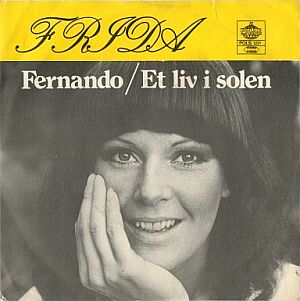
"Fernando" is a song written by Benny Andersson and Björn Ulvaeus,from the Swedish musical group ABBA. The song was written for their fellow group member Anni-Frid Lyngstad and was included on her 1975 album Frida ensam.

"The Name of the Game" is a 1977 song by Swedish pop group ABBA,released as the first single from the group's fifth studio album,ABBA:The Album (1977). It became a UK number one,topping the UK Singles Chart for four weeks in November 1977.

"One of Us" is a song by Swedish pop group ABBA. It was released in December 1981 as the lead single from the band's eighth studio album,The Visitors (1981).
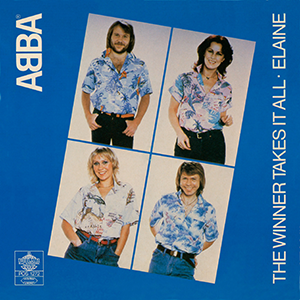
"The Winner Takes It All" is a song recorded by Swedish pop group ABBA. Released as the first single from the group's seventh studio album,Super Trouper (1980),it is a ballad in the key of G-flat major,reflecting on the end of a relationship. The single's B-side was the non-album track "Elaine". The song peaked at No.1 in several countries,including the UK,where it became their eighth chart-topper. It was also the group's final top 10 hit in the United States. It was written by Björn Ulvaeus and Benny Andersson,with Agnetha Fältskog singing the lead vocal.
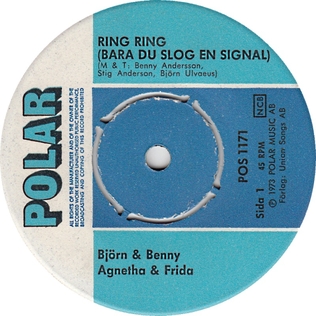
"Ring Ring" is a song by Swedish group ABBA,released as the title track of their 1973 debut album. The single gave the group their big break in several European countries (although the rest of Europe,North America and Australia would be introduced to ABBA the following year). The song was written in Swedish by Benny Andersson and Björn Ulvaeus,along with their manager Stig Anderson,with an original title of "Ring Ring (Bara du slog en signal)" ("Ring Ring (If Only You Called)"). Translation into English lyrics was helped by Neil Sedaka and his collaborator Phil Cody. The Swedish version reached No. 1 in the Swedish charts.

"Gimme! Gimme! Gimme!" is a song by Swedish band ABBA. It was recorded in August 1979 in order to help promote their North American and European tour of that year,and was released on ABBA's Greatest Hits Vol. 2 album as the brand new track.

"Honey,Honey" is a song by the Swedish pop group ABBA. It was released as the second single from their second studio album,Waterloo,after the success of the title track at the 1974 Eurovision Song Contest.
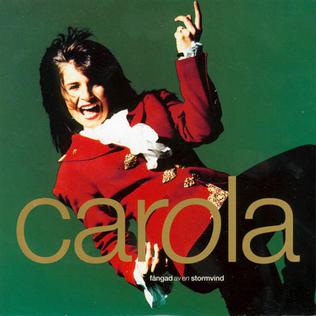
"Fångad av en stormvind" is a song by Swedish singer-songwriter Carola Häggkvist. It was written and produced by Stephan Berg. The song is the best known as Sweden's winning entry at the Eurovision Song Contest 1991 held in Rome,Italy,with 146 points.
Swedish popular music,or shortly Swedish pop music,refers to music that has swept the Swedish mainstream at any given point in recent times. After World War II,Swedish pop music was heavily influenced by American jazz,and then by rock-and-roll from the U.S. and the U.K. in the 1950s and 1960s,before developing into dansband music. Since the 1970s,Swedish pop music has come to international prominence with bands singing in English,ranking high on the British,New Zealand,American,and Australian charts and making Sweden one of the world's top exporter of popular music by gross domestic product.
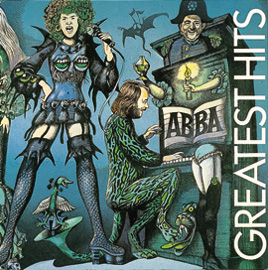
Greatest Hits is a compilation album by the Swedish pop group ABBA. It was originally released in Scandinavia on 17 November 1975 and in other parts of the world in 1976,notably the UK on 10 April,and on 18 September in the US and Canada. The 1976 version of the album included the band's most recent single "Fernando".
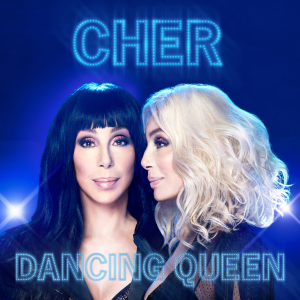
Dancing Queen is the twenty-sixth studio album by American singer Cher,released by Warner Bros. Records on September 28,2018. It is Cher's first album in five years,following Closer to the Truth (2013). The album contains cover versions of songs recorded by Swedish pop group ABBA,with the title referencing their 1976 song "Dancing Queen". The album follows Cher's appearance in the 2018 musical film Mamma Mia! Here We Go Again,based on the music of ABBA.



















